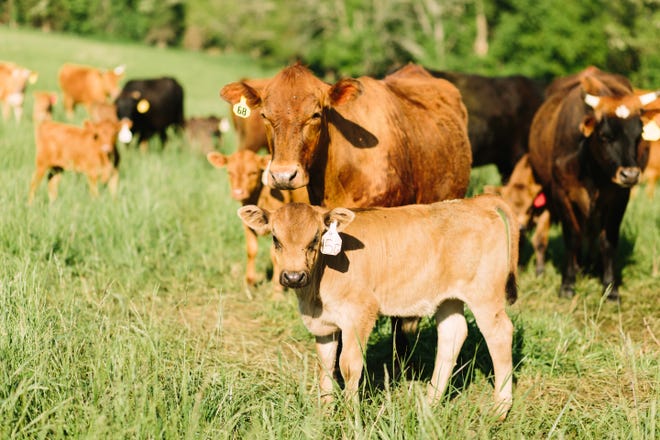Commentary: What's worse for the environment, burping cows or a leaky gas industry?

Cows do burp, but the burp goes much deeper. It is about a leaking gas industry, an unsustainable supply chain, poor food choices and food waste.
Lately, it seems that interest in climate change and greenhouse gas emissions has new life in a nation known to avoid acting and continue subsiding fossil fuels. Perhaps because it is something people can better relate to, and yes, it’s eye-catching. Now cows have become the sudden bullseye for climate change.
“One cow emits 250lbs Methane per year. Cows if a country would be the third-largest producer of greenhouse gasses after the US and China.” Or “Big Agriculture Companies are paid to kill our planet.” Both statements are circulating the news lines.
Cows burp methane and cows are visible. But why are the countless invisible methane leaks from landfills and oil and gas wells still left leaking and unaccounted for? Left unmonitored makes them even more dangerous.
More:Overwhelmed by solar projects, US's largest grid operator seeks 2-year pause
Contrary to natural gas leaks, cattle’s methane belching is accounted for. But their unique ruminating ability to digest feed from which humans cannot benefit adds value and turns simple forage into high-quality human food. The methane and manure from grazing livestock are sequestered and part of the carbon cycle. That’s how nature is designed.
Natural gas made up 37% of US electricity generation in 2021, but there are no reliability standards for pipelines moving energy. That’s because the fossil fuel industry, supported by congressional conservatives, is opposed to legislation directing the Federal Energy and Regulatory Commission to develop reliability and cybersecurity standards for natural gas and other pipelines. The Transportation Security Administration oversees it. The Fossil Fuel industry finds any regulation a waste of taxpayers’ money.
Significant plume events are now identified and reported in many U.S. states using satellite data, but still not counted in inventory listings. Methane globally, including the U.S., accounts for 8-12% of all releases from the oil and gas sector. That gas is supposed to stay inside the pipelines. Other reports find significant gas leaks during transfers and in residential homes' gas stovetops.
Grazing cattle is a positive contributor to a healthy ecosystem. So would pigs and chickens if let out of their cages. Byproducts from processing food for humans are part of livestock forage, thereby reducing what is going to landfills. Landfills are the third-largest emitter of methane, so taking away ruminating livestock would dramatically increase methane from landfills.
More:How coal companies walked away from their 'absolutely massive' environmental catastrophes
Incorporating alternative industrial by-products like “spent grain from distilleries” with high sugar and protein content reduces methane belching. It is a valuable feed input and a win-win as it further reduces waste going to landfills.
In the U.S., livestock grazing is an aid in land preservation; they graze mostly land unsuitable for other crops. Cattle, when grazing land, return the carbon dioxide CO2 the plants sequester to the soil where it belongs. The burp and the manure are recycled.
The negative impact on the environment starts when cattle enter the oversized and complicated supply chain controlled by the food-conglomerates. They also control the price paid to farmers and raise cattle in “concentration camps” to produce higher volumes of unsustainable meat per acres.
The profit made by the food-conglomerates never reaches the farmers producing commercial beef, ultimately out-competing farming communities at a high social and environmental cost to rural communities. Some are the deterioration of food values, loss of good farmland sold for subdivisions, loss of local job opportunities and spiraling ecological damage.
A conversation on improving agriculture is needed, but it’s not beef versus beans or cheese versus corn. We need a transformation based on bio-diverse farming principles, restoring and regenerating soil as we use it. Cropped lands producing corn and soybeans would benefit from livestock eating crop spills, reducing hazardous fertilizers and restoring the soil.
Farmers are already selecting high-yielding dairy cows that produce less methane per unit of milk, and beef cattle farmers are breeding cattle with improved genetics for more meat per head, belching less methane per pound of flesh.
Lastly, how does human food waste compare to cows’ burps? The EPA estimates that the U.S. wastes 405 pounds of edible food waste per person per year. That amounts to 1620 pounds of edible food waste per year for a family of four. Fruits and vegetables are the most wasted foods, followed by dairy and eggs.
A Swedish study finds that for every six pounds of edible food waste, the equivalent of 23 kg CO2e is produced. So, a family of four produces up to six metric tons of CO2e per year. One cow’s methane belching of 250 pounds a year converts to a good three metric tons of carbon dioxide equivalents (CO2e). A family of fours’ food waste emits twice as much CO2e as one cow burps!
The Food and Agricultural Organization of the United Nations states in one report: “If food waste were a country, it would be the third-highest emitter of greenhouse gasses after the US and China.”
Cattle have invaluable contributions to society compared to human waste! It’s not about beef or the burp. It’s about a society where food processing has gone bad! It reflects poor food choices and food waste despite calling itself the wealthiest country in the world!
Kris O'Daniel is a native of Denmark and has a Master of Dairy Science and Engineering background. Her first employment was as an Associate Expert at the United Nations Food and Agricultural Organization (FAO) stationed in Chiang Mai, Thailand conducting training courses in the Far East. She and her husband own Zelma Farm in Springfield, Kentucky. A cow-calf operation producing beef cattle with improved genetics. Kris is passionate about the environment.